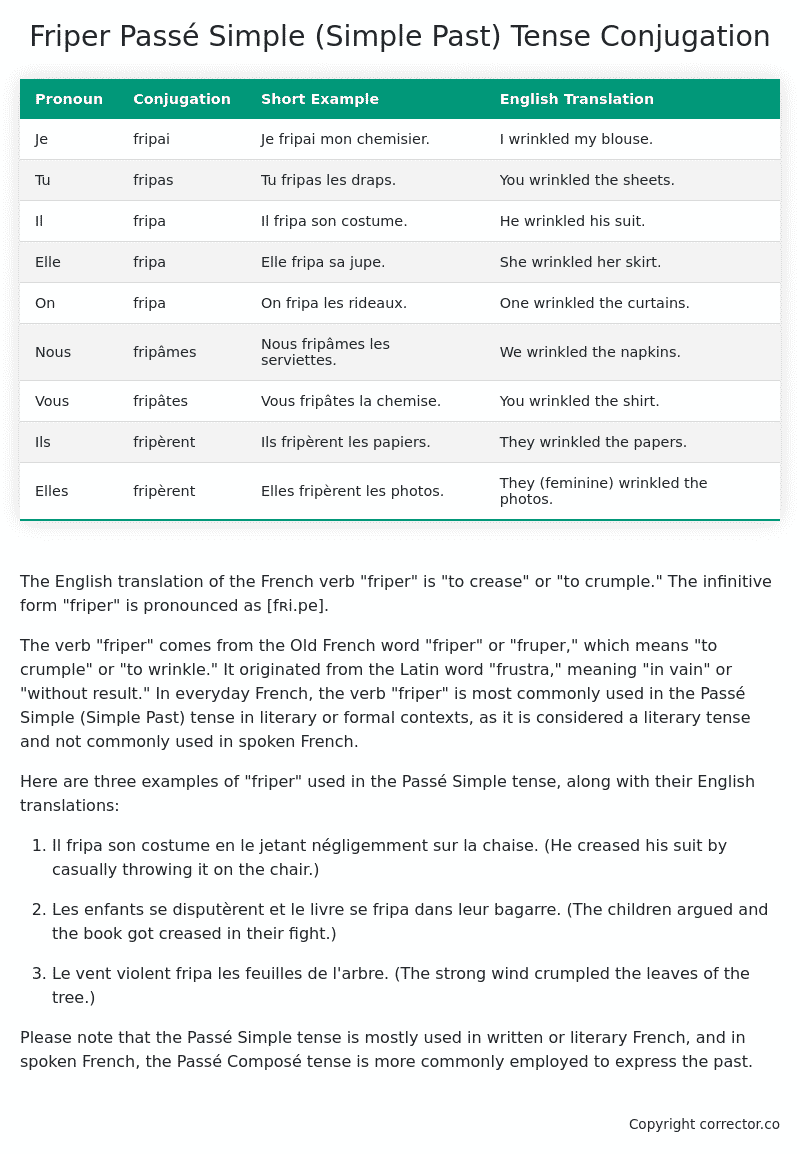Passé Simple (Simple Past) Tense Conjugation of the French Verb friper
Introduction to the verb friper
The English translation of the French verb “friper” is “to crease” or “to crumple.” The infinitive form “friper” is pronounced as [fʀi.pe].
The verb “friper” comes from the Old French word “friper” or “fruper,” which means “to crumple” or “to wrinkle.” It originated from the Latin word “frustra,” meaning “in vain” or “without result.” In everyday French, the verb “friper” is most commonly used in the Passé Simple (Simple Past) tense in literary or formal contexts, as it is considered a literary tense and not commonly used in spoken French.
Here are three examples of “friper” used in the Passé Simple tense, along with their English translations:
-
Il fripa son costume en le jetant négligemment sur la chaise.
(He creased his suit by casually throwing it on the chair.) -
Les enfants se disputèrent et le livre se fripa dans leur bagarre.
(The children argued and the book got creased in their fight.) -
Le vent violent fripa les feuilles de l’arbre.
(The strong wind crumpled the leaves of the tree.)
Please note that the Passé Simple tense is mostly used in written or literary French, and in spoken French, the Passé Composé tense is more commonly employed to express the past.
Table of the Passé Simple (Simple Past) Tense Conjugation of friper
| Pronoun | Conjugation | Short Example | English Translation |
|---|---|---|---|
| Je | fripai | Je fripai mon chemisier. | I wrinkled my blouse. |
| Tu | fripas | Tu fripas les draps. | You wrinkled the sheets. |
| Il | fripa | Il fripa son costume. | He wrinkled his suit. |
| Elle | fripa | Elle fripa sa jupe. | She wrinkled her skirt. |
| On | fripa | On fripa les rideaux. | One wrinkled the curtains. |
| Nous | fripâmes | Nous fripâmes les serviettes. | We wrinkled the napkins. |
| Vous | fripâtes | Vous fripâtes la chemise. | You wrinkled the shirt. |
| Ils | fripèrent | Ils fripèrent les papiers. | They wrinkled the papers. |
| Elles | fripèrent | Elles fripèrent les photos. | They (feminine) wrinkled the photos. |
Other Conjugations for Friper.
Le Present (Present Tense) Conjugation of the French Verb friper
Imparfait (Imperfect) Tense Conjugation of the French Verb friper
Passé Simple (Simple Past) Tense Conjugation of the French Verb friper (You’re reading it right now!)
Passé Composé (Present Perfect) Tense Conjugation of the French Verb friper
Futur Simple (Simple Future) Tense Conjugation of the French Verb friper
Futur Proche (Near Future) Tense Conjugation of the French Verb friper
Plus-que-parfait (Pluperfect) Tense Conjugation of the French Verb friper
Passé Antérieur (Past Anterior) Tense Conjugation of the French Verb friper
Futur Antérieur (Future Anterior) Tense Conjugation of the French Verb friper
Subjonctif Présent (Subjunctive Present) Tense Conjugation of the French Verb friper
Subjonctif Passé (Subjunctive Past) Tense Conjugation of the French Verb friper
Subjonctif Imparfait (Subjunctive Imperfect) Tense Conjugation of the French Verb friper
Subjonctif Plus-que-parfait (Subjunctive Pluperfect) Tense Conjugation of the French Verb friper
Conditionnel Présent (Conditional Present) Tense Conjugation of the French Verb friper
Conditionnel Passé (Conditional Past) Tense Conjugation of the French Verb friper
Conditionnel Passé II (Conditional Past II) Tense Conjugation of the French Verb friper
L’impératif Présent (Imperative Present) Tense Conjugation of the French Verb friper
L’impératif Passé (Imperative Past) Tense Conjugation of the French Verb friper
L’infinitif Présent (Infinitive Present) Tense Conjugation of the French Verb friper
L’infinitif Passé (Infinitive Past) Tense Conjugation of the French Verb friper
Le Participe Présent (Present Participle) Tense Conjugation of the French Verb friper
Le Participe Passé (Past Participle) Tense Conjugation of the French Verb friper
Struggling with French verbs or the language in general? Why not use our free French Grammar Checker – no registration required!
Get a FREE Download Study Sheet of this Conjugation 🔥
Simply right click the image below, click “save image” and get your free reference for the friper Passé Simple tense conjugation!

Friper – About the French Passé Simple (Simple Past) Tense
Formation
Usage
Narration
Historical Context
Interactions with other tenses
Passé Composé
Imparfait
Conditional and Subjunctive
Summary
I hope you enjoyed this article on the verb friper. Still in a learning mood? Check out another TOTALLY random French verb conjugation!


